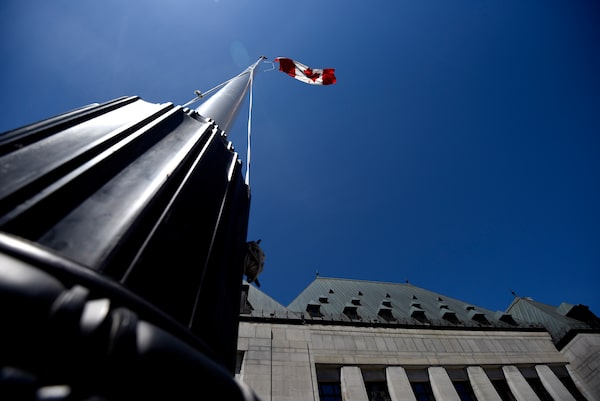
Lawyers have been exempt from reporting suspicious transactions to the Financial Transactions and Reports Analysis Centre of Canada since a 2015 Supreme Court of Canada decision found Ottawa’s previous reporting requirements could subject lawyers to unreasonable search and seizure.Justin Tang/The Canadian Press
Lawyers like loopholes when it comes to their own conduct.
New anti-money-laundering requirements for Ontario lawyers came into effect this month, but it’s already clear the perfunctory measures, which are being self-imposed by the profession rather than mandated by Ottawa, will do nothing to combat financial crime.
The rules safeguard a self-regulatory system that still gives lawyers too many ways to avoid rigorous scrutiny of their clients. Worse, those legal professionals maintain a smokescreen that dissuades the federal government from finally pursuing a constitutionally compliant reporting regime for them.
Lawyers have been exempt from reporting suspicious transactions to the Financial Transactions and Reports Analysis Centre of Canada since a 2015 Supreme Court of Canada decision found Ottawa’s previous reporting requirements could subject lawyers to unreasonable search and seizure – or incarceration – if they refused to violate solicitor-client privilege, including by handing over records. That ruling, however, left the door open for Ottawa to revise its legislation so that it aligns with the Charter of Rights and Freedoms.
Of course, the government never pursued that course of action even though the RCMP pushed for it. This is Canada, after all – the place where logic goes to die. So lawyers have maintained their own anti-money-laundering and anti-terrorist-financing rules ever since.
Canada should crack down on tax evasion and put that revenue to good use
That brings us back to the Law Society of Ontario’s amended anti-money-laundering measures, which are designed to maintain the status quo of self-regulation. The new requirements, which took effect Jan. 1, are based on modified model rules from the Federation of Law Societies of Canada, an umbrella group of the provincial and territorial entities through which lawyers regulate themselves. (Each law society is responsible for implementing the federation’s changes in its own code of conduct.)
Although the new measures require lawyers to conduct enhanced due diligence on their clients, they largely rely on an honour system. For instance, lawyers are now required to obtain and record information from their clients about the source of funds used for retainers. But they are not required to verify the accuracy of that information.
Should red flags arise, lawyers are urged to press their clients for additional details. But, as some lawyers have rightly pointed out, criminals will never admit their money was generated by illegal activity.
The new rules also require lawyers to monitor retainers periodically to determine whether clients’ instructions, activities and source of funds continue to mesh with previous due diligence. While the goal is to prevent lawyers from being duped into assisting clients with criminal activity, there are no hard and fast rules on how often they must conduct such monitoring activities.
And while any upstanding lawyer would certainly terminate a client relationship if they suspected they were being tricked into assisting with money laundering or other financial crimes, those concerns are unlikely to be reported to law enforcement.
This is precisely why report after report has concluded that the exclusion of lawyers from the federal anti-money-laundering regime is an impediment to Canada’s ability to combat financial crime.
The Financial Action Task Force, an intergovernmental body, has said it “constitutes a significant loophole.” That concern has been echoed by others, especially when it comes to money laundering in the real estate market.
“Real estate transactions usually involve lawyers and their trust accounts,” says the Department of Finance’s own risk assessment. “These lawyers can knowingly or unknowingly provide legitimacy and/or obscure the source of illegally sourced funds.”
More recently, the issue has come up at the Cullen Commission of Inquiry into Money Laundering in British Columbia, which is expected to produce its final report this year.
“Lawyers are the ‘black hole’ of real estate and of money movement generally. With no visibility by law enforcement on what enters and leaves a lawyer’s trust account, many investigations are stymied,” reads a B.C. government-commissioned report authored by Peter German, a lawyer and former RCMP deputy commissioner.
Mr. German has argued that, at the very least, there must be visibility into the financial accounts maintained by lawyers. “There is no suggestion that privileged solicitor-client communications should be impacted,” he writes.
Other countries have created effective workarounds. In Britain, lawyers are also self-regulated. But the Office for Professional Body Anti-Money Laundering Supervision, which is part of the Financial Conduct Authority, oversees those legal professional bodies.
“Any industry without some kind of external oversight mechanism opens itself up to further vulnerability – if not directly from any money laundering vulnerabilities they were already facing, then the issue of trust,” said James Cohen, executive director of Transparency International Canada, a non-governmental anti-corruption organization. “It’s crucial for the upkeep of the rule of law to have that trust.”
Trouble is, the Trudeau government isn’t known for taking bold action. In 2019, it created a working group with the Federation of Law Societies of Canada to address “inherent risks of money laundering and other illicit activity” in the legal profession.
But to hear the lawyers tell it, Ottawa is in no hurry to pursue a constitutionally compliant way of including lawyers in the federal regime.
“The government has indicated publicly that it supports this collaborative approach [the working group] and we have been advised that it has no plans at present to renew efforts to regulate members of the legal profession,” reads a 2021 correspondence from the Federation of Law Societies of Canada.
Good grief.
The Law Society of Ontario’s new anti-money-laundering rules underscore why it is a mistake to prioritize self-regulation over the public interest when it comes to fighting financial crime. Ottawa must close this lawyer loophole once and for all.
Your time is valuable. Have the Top Business Headlines newsletter conveniently delivered to your inbox in the morning or evening. Sign up today.
 Rita Trichur
Rita Trichur